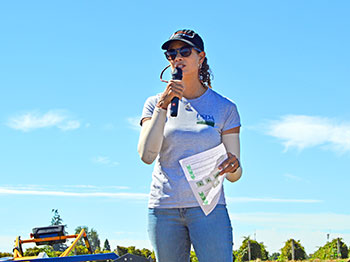Research Focuses on Aphids and the Viruses they Vector
Dalila Rendon, a postdoctoral research associate at Oregon State University, is looking into several questions surrounding aphids in blueberries that have yet to be answered, including aphid phenology in the Oregon crop.
 |
Dalila Rendon at the OSU Blueberry Field Day provides a presentation on research into questions surrounding aphids in Oregon blueberries. |
“This is something that has been studied more in British Columbia, but in Oregon, we actually don’t know when they appear and when they are most abundant. So, this year we started monitoring in five different farms,” Rendon said at the OSU Blueberry Field Day in July.
Initial findings from pan traps and manual searching in the leaves of blueberry plants are showing that aphids tend to peak from late May to late June, well ahead of the spotted wing drosophila. “I think the sprays for spotted wing drosophila may be too late for aphids,” Rendon said, “because aphids tend to peak earlier in the season.”
She added, however, that more research is needed to better understand the phenology and infection rates of aphids before researchers are prepared to provide management recommendations.
Rendon’s research also is looking into which aphid species are present in Oregon blueberries and which ones carry the scorch virus, blueberry virus S and blueberry virus L.
“Right now we are focusing on these three complexes of viruses, but this is something that can apply to many blueberry viruses that are transmitted by aphids,” Rendon said.
In preliminary findings from last year, researchers found a high prevalence of blueberry virus L in the aphids. “Almost forty percent of the samples were infected with this virus,” she said.
They didn’t find any scorch virus nor blueberry virus S in the aphids. “But this was only from a small sample of aphids from one farm in late summer,” Rendon said.
Researchers are continuing the study this year and expect to have more results to share soon, she said.
Further, Rendon said that researchers are looking into the effects of different timings of imidacloprid sprays on preventing aphids from infecting plants. In that project, researchers are exposing potted plants in blueberry fields to viruses at different points during the 2024 growing season and treating some with the chemistry. “And then we are going to test the plants for viruses to see when they’re getting infected out in the field.
“So, stay tuned for that,” she said.